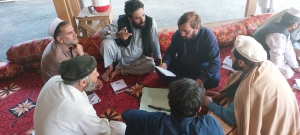Kalkoti language turns into written form
The Kalkoti language speakers have started celebrating a writing system they developed after attending a series of training workshops under the banner of FLI. The community people including teachers, students and other educated groups of the language gathered at night and, as per the tradition to mark the achievement of any milestone, slaughtered a goat. Earlier, they concluded their fifth day of the Basic Orthography Development workshop, FLI organized for them which was attended by more than a dozen community members. During the workshop, they reached an agreement to select script and symbols to represent the unique sounds of their language for writing. FLI’s training team guided them through the process and congratulated them on their accomplishment. So far, FLI has conducted two training workshops for Kalkoti researchers after they demanded training from the organization and formed a group of the community members to be trained. Following, the selected people were engaged in various types of training where they identified issues of their language, discovered vowels and consonants before formally deliberating on development of its writing system. The latest was the workshop of orthography development which turned the language into the written form. From now on, the educated people in the Kalkoti community can develop their literature in their own language.
The celebration was joined by the Executive Director of FLI, Mr. Fakhruddin who applauded the participants’ consistent interest to work for their language and congratulated them over their achievement in developing the writing system. Kalkotis is the 22nd language of northern Pakistan FLI reached out to and worked for its preservation. Belonging to the Shina group of Dardic languages, the Kalkoti is spoken in the Kalkot area of Dir Kohistan in KP province. Community members claim there are 15,000 people who speak the language as their mother tongue. As a result, the Kalkoti language has got its writing system and more than a dozen people trained to document it. We hope that now, the community people will take the lead and keep developing literature in their language. FLI will always be available for assistance and guidance so that the language could be preserved and promoted through a process of empowerment of the speakers.





Leave a Reply
Want to join the discussion?Feel free to contribute!